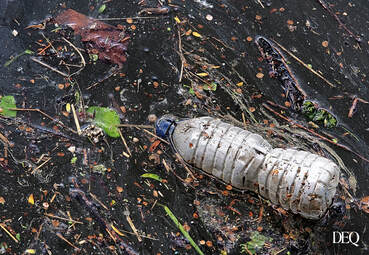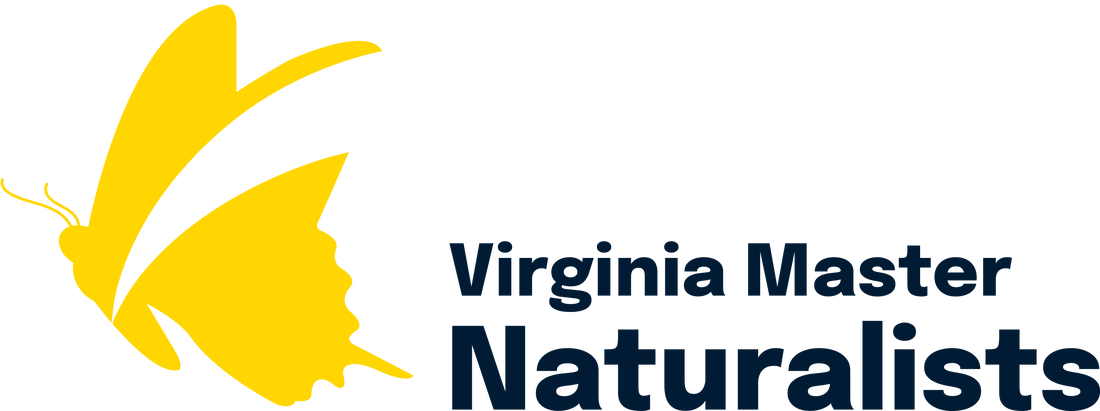--Written By Katie Register (Clean Virginia Waterways) with additions from Virginia Witmer (Virginia Coastal Zone Management Program) and submitted by Ann Regn (Virginia Department of Environmental Quality)
Trash, from littering, mis-managed trash cans, or uncovered trucks, travels through watersheds via stormwater and ends up in our rivers, bays and ocean. About 60% to 80% comes from our activities on land. A study by the Virginia Aquarium and Clean Virginia Waterways (CVW), funded by the Virginia Coastal Zone Management (CZM) Program at the Virginia Department of Environmental Quality (DEQ), found that 83% of trash on Virginia’s beaches was made of plastic, and most of it was single-use items (bottles, cups, straws, food wrappers).
Volunteers who collected data during the 2020 International Coastal Cleanup reported that the Top Ten list is dominated by food and beverage-related single-use items – most made of plastic:
1. Cigarette Butts
2. Food Wrappers
3. Beverage Bottles (Plastic)
4. Beverage Cans
5. Grocery Bags (Plastic)
6. Food Containers (Foam + Plastic)
7. Bottle Caps (Plastic)
8. Beverage Bottles (Glass)
9. Cups, Plates (Foam + Plastic)
10. Straws, Stirrers
“We are increasingly using a permanent material – plastic – for temporary uses,” explains Katie Register, executive director of Clean Virginia Waterways at Longwood University. “Cleaning up is part of the solution, but we need to “turn off the faucet” of plastic single-use waste in our lives,” stresses Register.
Virginia has made some progress—recent laws will phase out polystyrene food containers (often called “Styrofoam”) over the next 4 years, and it is now illegal to release any helium-filled balloons into the air. Local governments now have authority to place five-cent fees on single-use plastic bags. Funds raised from this fee will help local communities prevent and clean up litter.
The Virginia Marine Debris Reduction Plan, being updated by the CVW and the Virginia CZM Program this year, will provide a roadmap and involve many partners, to reduce single-use litter and other marine debris. CVW, along with the Eco Maniac Company and the Virginia CZM also co-founded the Virginia Plastic Pollution Prevention Network (VPPPN) in 2020 to increase collaboration across Virginia. The VPPPN links groups across the Commonwealth. Learn more and join the network.
“We need to work together to stem the tide of marine debris. Laws and policies also are only part of the solution. Our daily choices and decisions matter tremendously. Choose reusable bags, coffee mugs and water bottles,” urges Register. “And pick up litter—whether on your own or as part of a community effort. It all adds up.”
For more a schedule of clean-ups, visit: http://www.longwood.edu/cleanva/cleanupevents2021.html.
Trash, from littering, mis-managed trash cans, or uncovered trucks, travels through watersheds via stormwater and ends up in our rivers, bays and ocean. About 60% to 80% comes from our activities on land. A study by the Virginia Aquarium and Clean Virginia Waterways (CVW), funded by the Virginia Coastal Zone Management (CZM) Program at the Virginia Department of Environmental Quality (DEQ), found that 83% of trash on Virginia’s beaches was made of plastic, and most of it was single-use items (bottles, cups, straws, food wrappers).
Volunteers who collected data during the 2020 International Coastal Cleanup reported that the Top Ten list is dominated by food and beverage-related single-use items – most made of plastic:
1. Cigarette Butts
2. Food Wrappers
3. Beverage Bottles (Plastic)
4. Beverage Cans
5. Grocery Bags (Plastic)
6. Food Containers (Foam + Plastic)
7. Bottle Caps (Plastic)
8. Beverage Bottles (Glass)
9. Cups, Plates (Foam + Plastic)
10. Straws, Stirrers
“We are increasingly using a permanent material – plastic – for temporary uses,” explains Katie Register, executive director of Clean Virginia Waterways at Longwood University. “Cleaning up is part of the solution, but we need to “turn off the faucet” of plastic single-use waste in our lives,” stresses Register.
Virginia has made some progress—recent laws will phase out polystyrene food containers (often called “Styrofoam”) over the next 4 years, and it is now illegal to release any helium-filled balloons into the air. Local governments now have authority to place five-cent fees on single-use plastic bags. Funds raised from this fee will help local communities prevent and clean up litter.
The Virginia Marine Debris Reduction Plan, being updated by the CVW and the Virginia CZM Program this year, will provide a roadmap and involve many partners, to reduce single-use litter and other marine debris. CVW, along with the Eco Maniac Company and the Virginia CZM also co-founded the Virginia Plastic Pollution Prevention Network (VPPPN) in 2020 to increase collaboration across Virginia. The VPPPN links groups across the Commonwealth. Learn more and join the network.
“We need to work together to stem the tide of marine debris. Laws and policies also are only part of the solution. Our daily choices and decisions matter tremendously. Choose reusable bags, coffee mugs and water bottles,” urges Register. “And pick up litter—whether on your own or as part of a community effort. It all adds up.”
For more a schedule of clean-ups, visit: http://www.longwood.edu/cleanva/cleanupevents2021.html.



 RSS Feed
RSS Feed